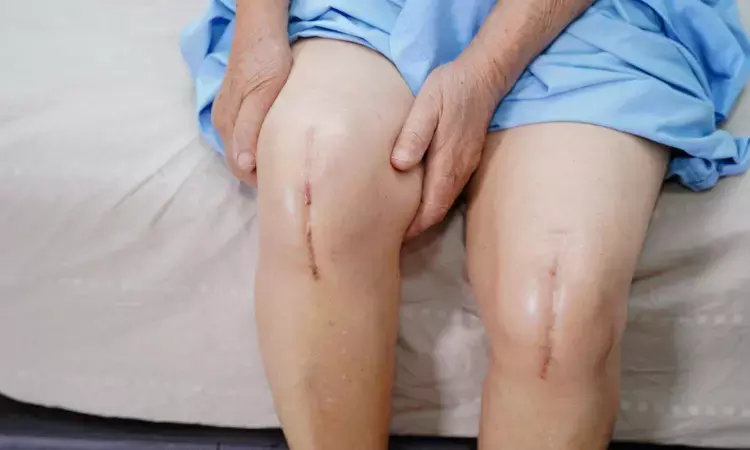- Home
- Medical news & Guidelines
- Anesthesiology
- Cardiology and CTVS
- Critical Care
- Dentistry
- Dermatology
- Diabetes and Endocrinology
- ENT
- Gastroenterology
- Medicine
- Nephrology
- Neurology
- Obstretics-Gynaecology
- Oncology
- Ophthalmology
- Orthopaedics
- Pediatrics-Neonatology
- Psychiatry
- Pulmonology
- Radiology
- Surgery
- Urology
- Laboratory Medicine
- Diet
- Nursing
- Paramedical
- Physiotherapy
- Health news
- Fact Check
- Bone Health Fact Check
- Brain Health Fact Check
- Cancer Related Fact Check
- Child Care Fact Check
- Dental and oral health fact check
- Diabetes and metabolic health fact check
- Diet and Nutrition Fact Check
- Eye and ENT Care Fact Check
- Fitness fact check
- Gut health fact check
- Heart health fact check
- Kidney health fact check
- Medical education fact check
- Men's health fact check
- Respiratory fact check
- Skin and hair care fact check
- Vaccine and Immunization fact check
- Women's health fact check
- AYUSH
- State News
- Andaman and Nicobar Islands
- Andhra Pradesh
- Arunachal Pradesh
- Assam
- Bihar
- Chandigarh
- Chattisgarh
- Dadra and Nagar Haveli
- Daman and Diu
- Delhi
- Goa
- Gujarat
- Haryana
- Himachal Pradesh
- Jammu & Kashmir
- Jharkhand
- Karnataka
- Kerala
- Ladakh
- Lakshadweep
- Madhya Pradesh
- Maharashtra
- Manipur
- Meghalaya
- Mizoram
- Nagaland
- Odisha
- Puducherry
- Punjab
- Rajasthan
- Sikkim
- Tamil Nadu
- Telangana
- Tripura
- Uttar Pradesh
- Uttrakhand
- West Bengal
- Medical Education
- Industry
Stay Moving: Exercise After Knee Replacement Cuts Heart and Stroke Risks, Study Suggests

South Korea: Patients undergoing total knee arthroplasty (TKA) face elevated risks of cardiovascular and cerebrovascular diseases in the years following surgery, but maintaining or increasing physical activity can significantly reduce these risks, a new nationwide cohort study has revealed.
The research, published in The Journal of Bone and Joint Surgery by Dr. Hyung Jun Park and colleagues from the Department of Orthopedic Surgery, Korea University Ansan Hospital, Korea University College of Medicine, underscores the protective role of exercise in patients recovering from TKA. The investigators found that individuals who consistently engaged in physical activity after surgery had markedly lower rates of cardiovascular and cerebrovascular events compared to those who remained inactive or reduced their activity levels.
The study analyzed data from the Korean National Health Insurance Service, focusing on patients who had no history of cardiovascular or cerebrovascular disease at baseline and who underwent routine health examinations spaced two to four years apart. Participants were grouped into those who had a knee replacement surgery and those who did not. Physical activity was assessed based on the frequency of moderate-to-vigorous intensity exercises, categorized from inactive to highly active (at least five sessions per week). Patients were followed for five years to determine their long-term risks of cardiovascular and cerebrovascular disease.
The study led to the following notable findings:
- Patients who underwent TKA had higher incidences of cardiovascular disease (19.3% vs 17.1% in controls) and cerebrovascular disease (25.7% vs 23.9% in controls).
- Maintaining high activity levels (exercising five or more times per week) was linked to lower cardiovascular risk (HR, 0.918) and cerebrovascular risk (HR, 0.890).
- Patients who were previously inactive but began exercising after surgery experienced significant reductions in both cardiovascular and cerebrovascular risks.
- Patients who had been active before surgery but became sedentary afterwards showed an increased incidence of cerebrovascular events.
“Patients who undergo TKA often experience improved mobility and reduced pain, which presents a crucial opportunity to adopt or sustain healthier activity habits,” the authors noted. “Our findings emphasize that regular exercise after surgery should be considered an essential component of long-term care and rehabilitation strategies.”
The study provides valuable insights for orthopedic surgeons, cardiologists, and rehabilitation specialists involved in the post-operative management of TKA patients. Given the rising global prevalence of knee replacements, these findings stress the importance of structured exercise programs and patient counseling to mitigate long-term cardiovascular and cerebrovascular risks.
While the retrospective design limited the ability to capture detailed patient-reported outcomes or lifestyle nuances, the large sample size and nationwide data provide strong evidence linking physical activity to better long-term health after knee replacement.
"The study suggests that engaging in regular physical activity—whether by maintaining pre-surgery exercise levels or adopting new routines—can play a pivotal role in reducing the heightened risks of cardiovascular and cerebrovascular diseases following TKA. For patients and caregivers, the message is clear: staying active after surgery is not optional, but essential for protecting heart and brain health," the authors concluded.
Reference:
Park, Hyung Jun MD, PhD1; Tae, Bum Sik MD, PhD2; Suh, Dong Hun MD, PhD1; Kim, Jae Gyoon MD, PhD1, a. Maintaining or Increasing Physical Activity Is Essential for Managing Cardiovascular and Cerebrovascular Risks After Total Knee Arthroplasty: A Nationwide Cohort Study. The Journal of Bone and Joint Surgery ():10.2106/JBJS.24.01588, September 2, 2025. | DOI: 10.2106/JBJS.24.01588
Dr Kamal Kant Kohli-MBBS, DTCD- a chest specialist with more than 30 years of practice and a flair for writing clinical articles, Dr Kamal Kant Kohli joined Medical Dialogues as a Chief Editor of Medical News. Besides writing articles, as an editor, he proofreads and verifies all the medical content published on Medical Dialogues including those coming from journals, studies,medical conferences,guidelines etc. Email: drkohli@medicaldialogues.in. Contact no. 011-43720751


